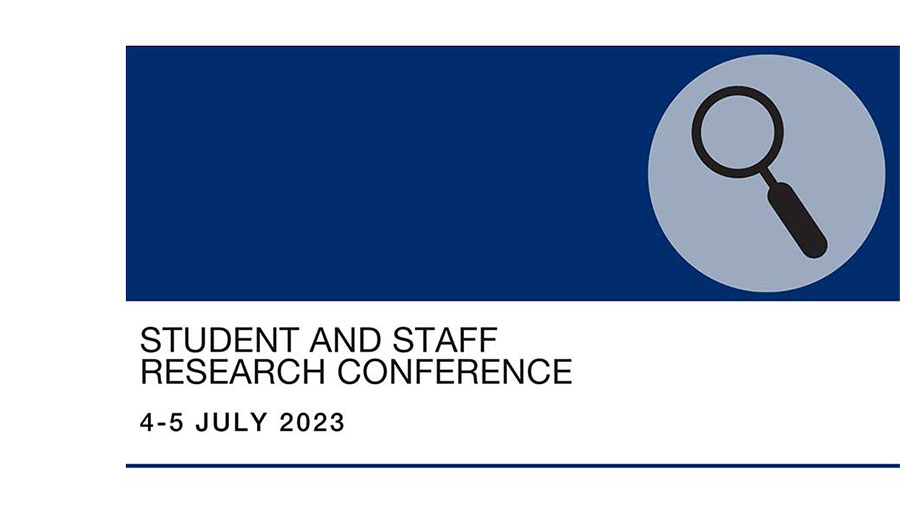Small Steps Matter: Research towards a better world
The fourth London Met Student and Staff Research Conference titled Small Steps Matter: Research Towards a Better World took place between 4 and 5 July at Holloway campus. Organised by our Postgraduate Research Student and Staff Liaison Forum, the event was a great opportunity to showcase some of the fantastic research undertaken by students and staff. The forum is chaired by Dr Eirini Meimaridou and student chair, Subeksha Shrestha. This was the first time the conference took place in person, since its inception in 2020.
The conference was opened by the Vice-Chancellor, Professor Lynn Dobbs and closed by our Pro Vice-Chancellor for Research and Knowledge Exchange, Professor Don MacRaild. Each day was opened by an external keynote lecture and closed by an internal one.
Keynote speakers included:
-
Dr Tinashe Mushakavanhu, Junior Research Fellow in African and Comparative Literature, St Anne’s College, Oxford
-
Professor Jeremy Howick, Professor of Empathic Healthcare and Director of the Stoneygate Centre for Empathic Healthcare, University of Leicester
-
Dr Bo Tang, Dr Beatrice De Carli and Hosn Houssami
The first keynote by Dr Tinashe Mushakavanhu was contemplative in nature, combining elements of his personal journey with that of Zimbabwean writer Dambudzo Marechera. He was joined in conversation by Professor Matthew Barac and PhD candidate, Alessia Dalceggio. The second external keynote lecture by Professor Jeremy Howick featured a combative challenge to the health system, presenting empirical evidence for the medical effects of empathy and empathy training, with the panel chaired by Professor Ken White and PhD candidate Shahab Hassan.
Papers from all five Schools at London Met were presented and we saw over 40 talks reporting on research about human health, women's economic roles, ICT, migration, research ethics, African literature and many more.
There were short blocks of three-minute lightning talks, 15-minute student and staff papers and poster presentations throughout the day.
Highlights were provided by both internal keynote lectures: Day one was closed by an emotionally intense presentation on the concept of intersectionality and school exclusions by Professional Doctorate in Education candidate Ama Agyeman and Dr Mabel Encinas, Day two by an impressive presentation on informal urban development, research co-production and sustainability in Lebanon, India and Sierra Leone by Vice-Chancellor's PhD Scholarship holder Hosn Houssami, Dr Bo Tang and Dr Beatrice De Carli.
The conference was rounded off by the award of prizes orchestrated masterly by Research Student Coordinator Oliver Brooks.
Awards and winners
There were five awards categories, all decided by the conference attendees during the live voting.
Best Poster
Winner: Natalie Langley for Where are the women? Investigating the absence of women in Angel Investing.
Best 20-minute Presentation
Winners: (ex-aequo) Sian Moxon, Justin Webb and Alexandros Semertzi for Wild Ways: Mixed-methods research to understand urban-rewilding behaviour in London's private gardens and Dr Dee Bhakta, Christopher Chamberlin, Dr Una Fairbrother, Dr Priyanka Ganguly, Professor Laurence Harbige, Dr Benjamin Hunter, Professor John Lodge, Dr Shawn McLaren, Professor Lijun Shang, Samuel Sowunmi, Mo Ahmed, Adriana Sevcuka, Shahab Hassan, Marwah Alanbaki, Maryam Saberi, Dr Cassandra Terry, Dr Eirini Meimaridou and Professor Ken White for A multidisciplinary approach to diabetes.
Best Recorded Presentation
Winner: Mareen Ruwandi Perrera for What is unlearning when you are an educator: Exploring how part-time higher education lecturers in Sri Lanka can unlearn to change their professional teacher identities.
Best Lightning Talk Day 1
Winner: Giovanni Bordone for The shift from mass production to mass personalisation: The impact of production on demand on the fashion industry.
Best Lightning Talk Day 2
Winners: (ex-aequo) Medah Ramchurn for Microplastics and Human Health and Malaravan Ragupalan for THP-1 cells' differentiation within the tumour microenvironment.

